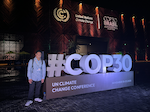
When Jerome Clarke ’17 first arrived on campus, he knew he wanted to seek out opportunities where he could make a difference.
“I decided a long time ago that I wanted to do impactful things on this campus,” Clarke said. “I oriented myself that way and charged at it, which just happens to land me in many of the different places I’ve landed in.”
He said he naturally found himself involved with the Center for Public Service and worked one of their Program Coordinators his sophomore year, working primarily with migrant education. A member of the Black Student Union, Clarke became a Diversity Peer Educator, advocating for issues of diversity and engaging the campus community in conversations about inclusivity.
In many ways, those experiences influenced and shaped his course work.
“Part of it was my inward development spilling into outwards development, and vice versa.” The English and philosophy double major explained. “I wanted to see what I could do for my friends and for the campus community at large. In trying to do as much as you can towards bettering the condition of others, you also better the condition of yourself.”

Through pursuing opportunities where he felt he could have an impact, Clarke found himself building relationships with faculty and administrators in ways that changed the trajectory of his College experience.
One of those changes came in the form of research as a Mellon Summer Scholar, a program offered by the Provost’s Office with funding from the Andrew W. Mellon Foundation, which allowed Clarke to research the mutualist relationship between philosophical frameworks that he learned about in class and the Black activism he was hearing and reading about in the news.
He was invited by Vice Provost Jack Ryan to present his research at Bates College, which was all the validation he needed to continue research outside of class, first with philosophy Prof. Dan DeNicola as a Frederick and Martha Mahan Fellow and then in an independent study examining new philosophical theories with philosophy Prof. Gary Mullen.
Another change came in the form of studying abroad. The Philadelphia native—who never traveled much outside of the city before College—received a lot of support to study abroad from his mentors in the English department, like Ryan and Profs. McKinley Melton and Chris Fee. They gave him a push, and ultimately helped him decide on a semester in Cairo, Egypt.
“They wanted me to experience this part of Gettysburg that they thought was really crucial, and they were totally right in every regard,” Clarke said.
It was his experiences there that would inspire him to build on his research and examine political movements through a new lens.
“Egypt was amazing, easily the most hospitable place on the planet, but also one of the most politicized,” Clarke said. “Everybody is tuned in to what was going on politically there. We were told not to engage in political conversations for safety reasons, but it was what everyone was talking about, and it was one of the most impactful aspects of my time there."
Clarke was able to witness first-hand the impact that student activists could have on the political process in Egypt, and how they organized and shared their message through social media.
“This idea really came to life in Egypt,” Clarke explained. “There seemed to be this weird shift where social media was very much involved in protest, and I wanted to examine that. The frame that made the most sense to me—because it was happening now—was the Movement for Black Lives and Black Lives Matter.”
He came back to the States with a renewed interest in political movements. He was in Cleveland during the first meeting for the Movement for Black Lives, and was connected with faculty members and resources at University of California, Berkeley campus—thanks to Ryan—in order to expand his research on how technology influences these movements.
All of this has played a fundamental role in shaping his next steps after graduation.
“The mentorship I’ve had here has made me think that I can give academia a try,” Clarke said. “I’m interested in studying critical theory, American studies, and critical race theory, so I’m looking into interdisciplinary programs. I hope to get a Ph.D. in philosophy, and from there, write.”


